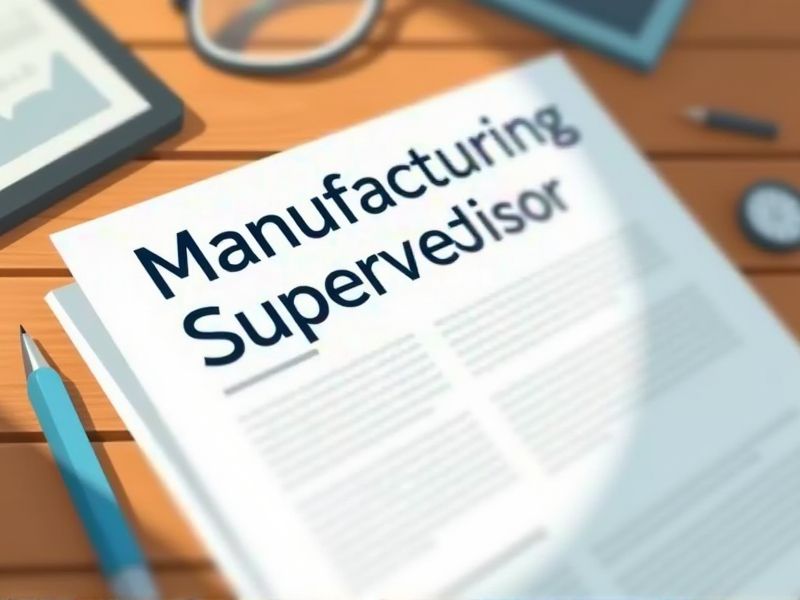
Manufacturing Production Supervisors are responsible for overseeing the production process and ensuring efficiency and quality in operations. Certain certifications equip supervisors with enhanced skills in process management, leadership, and quality assurance, which are crucial in maintaining competitive production standards. These certifications can also contribute to career advancement and demonstrate a commitment to professional development. Here are some essential certifications beneficial for a Manufacturing Production Supervisor.
Certified Production Supervisor (CPS)
A Certified Production Supervisor (CPS) provides formal validation of skills, enhancing credibility and trust among peers and subordinates. Their certification ensures that they possess essential knowledge in quality management, lean manufacturing, and leadership, which are critical for improving operational efficiency. With a CPS on board, organizations often witness reduced production errors, resulting in cost savings and improved product quality. Certification also plays a role in fostering a culture of continuous improvement and professional growth within the manufacturing team.
Lean Six Sigma Green Belt Certification
Lean Six Sigma Green Belt Certification equips a Manufacturing Production Supervisor with skills to enhance process efficiency and reduce waste. This certification promotes data-driven decision-making, leading to improved production quality and cost reduction. In competitive markets, supervisors with Green Belt knowledge help maintain high standards by identifying and solving operational challenges. Companies adopting Lean Six Sigma principles often experience increased productivity and reduced production downtime.
Six Sigma Black Belt Certification
Obtaining a Six Sigma Black Belt Certification equips a Manufacturing Production Supervisor with advanced problem-solving skills, leading to more efficient production processes. Mastery of Six Sigma methodologies can significantly reduce defects and waste, thereby improving product quality and customer satisfaction. Enhanced skills in statistical analysis allow supervisors to make data-driven decisions that optimize resource allocation and cost management. Possession of this credential often results in higher leadership competence, which can elevate team performance and drive continuous improvements in manufacturing operations.
OSHA 30-Hour Safety Certification
Manufacturing production supervisors often face complex safety hazards, making OSHA 30-Hour Safety Certification essential for understanding regulatory compliance and mitigating risks. Enhanced safety knowledge through certification leads to a reduction in workplace accidents and associated costs. Compliance with OSHA standards ensures the supervisor's decisions align with legal safety requirements, fostering a culture of safety within the organization. By completing the certification, supervisors become better equipped to train staff effectively, directly impacting overall safety performance and productivity.
Certified Manager of Quality/Organizational Excellence (CMQ/OE)
The CMQ/OE certification equips a Manufacturing Production Supervisor with advanced quality management and organizational skills, which helps in streamlining production processes and improving operational efficiency. This certification provides the supervisor with tools to implement effective quality control systems, reducing defects and minimizing waste. A certified supervisor can drive continuous improvement initiatives, fostering an innovative culture within the team. The knowledge gained through CMQ/OE enhances leadership capabilities, enabling the supervisor to better motivate their team and align production goals with overall organizational objectives.
Certified Quality Improvement Associate (CQIA)
A Certified Quality Improvement Associate (CQIA) equips a Manufacturing Production Supervisor with essential knowledge to implement effective quality management principles. Understanding these principles leads to process improvements, resulting in more efficient and cost-effective production methods. Enhanced quality assurance techniques decrease defect rates, providing a direct impact on product reliability and customer satisfaction. Training in CQIA methodologies ensures compliance with industry standards, which is crucial for maintaining a competitive edge in the manufacturing sector.
Project Management Professional (PMP)
The PMP certification equips a Manufacturing Production Supervisor with advanced project management skills, enhancing the efficiency of production processes. Knowledge from PMP enables effective resource allocation and risk management, leading to cost savings and higher productivity. With PMP methodologies, supervisors can implement standardized practices, ensuring consistent quality and timely delivery. Recognizing PMP as a credential can increase credibility and trust among team members and stakeholders, driving organizational success.
Certified Supply Chain Professional (CSCP)
Earning a Certified Supply Chain Professional (CSCP) designation equips a Manufacturing Production Supervisor with a comprehensive understanding of supply chain processes, enhancing their ability to streamline operations. This certification provides insights into global supply chain management, which can lead to more efficient resource utilization and cost reduction. It establishes credibility and recognition within the industry, positioning the supervisor as an expert and increasing potential for career advancement. The knowledge gained from CSCP training aids in mitigating supply chain risks, ensuring smoother production and delivery schedules.
ISO 9001:2015 Lead Auditor Certification
ISO 9001:2015 Lead Auditor Certification equips a Manufacturing Production Supervisor with the necessary skills to ensure compliance with international quality management standards, directly enhancing operational efficiency. This certification instills a deeper understanding of risk management and continuous improvement processes, facilitating better decision-making and problem-solving on the production floor. By standardizing quality management practices, supervisors can increase customer satisfaction and reduce product defects, which positively impacts the organization's reputation and competitiveness. The certification also demonstrates to employers a commitment to professional growth and adherence to industry best practices, which can lead to career advancement opportunities.
Certified Maintenance & Reliability Professional (CMRP)
Manufacturing Production Supervisors benefit from a CMRP certification as it enhances their ability to manage equipment and operations efficiently, leading to reduced downtime. The certification provides them with a deeper understanding of predictive maintenance techniques, resulting in prolonged equipment lifespan and cost savings. CMRP certification equips supervisors with standardized best practices that help to ensure consistent quality and safety in production processes. By having CMRP credentials, supervisors demonstrate a commitment to professional development, which can enhance their credibility and leadership within the manufacturing industry.
Summary
When you obtain certifications as a Manufacturing Production Supervisor, you enhance your management skills and technical expertise. This development often leads to improved operational efficiency and production quality within your team. Having certified credentials may also increase your career advancement opportunities, leading to potential promotions or higher salary prospects. Companies you work for typically experience reduced downtime and higher employee productivity due to your elevated management proficiency.
